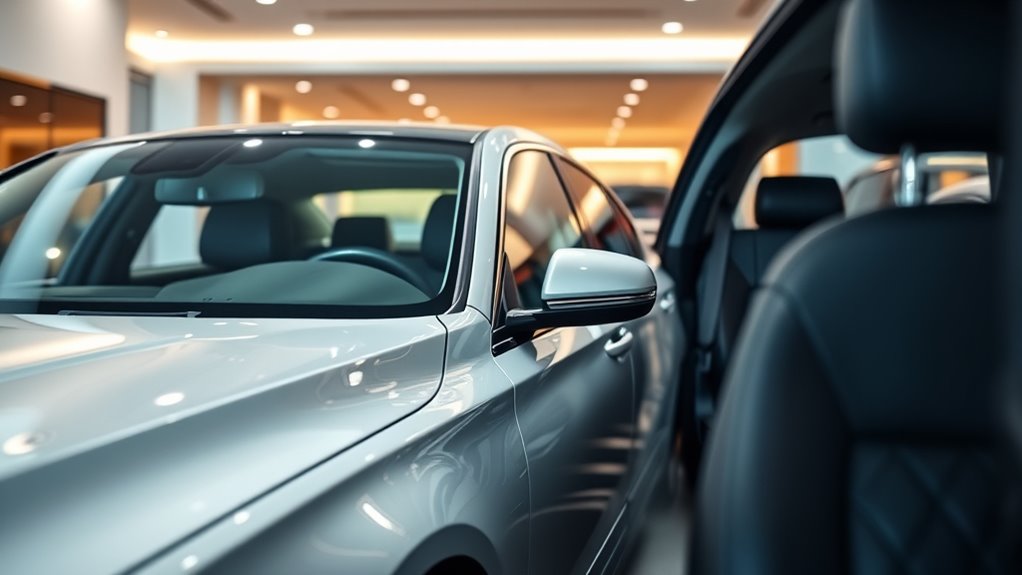If you’re deciding between leasing a new vehicle or buying used, consider your budget, driving habits, and long-term goals. Leasing often offers lower monthly payments and access to the latest features, but has mileage limits and no resale value. Buying used usually costs less upfront and builds equity, with fewer restrictions on usage. To make the best choice for your situation, explore how these options compare in detail below.
Key Takeaways
- Buying used minimizes depreciation loss and offers better long-term value, especially after the vehicle is paid off.
- Leasing provides lower monthly payments and includes warranty coverage, ideal for driving new models with the latest features.
- Used cars often require lower upfront costs but may have higher repair expenses once out of warranty.
- Leasing limits mileage and customization options, while buying used offers flexibility and no usage restrictions.
- Consider your driving habits, budget, and desire for new technology to choose the option that best fits your needs.

Deciding whether to lease a new vehicle or buy a used one can be a tough choice, especially with so many options available. Both routes have their advantages, but understanding the long-term implications can help you make an informed decision. One key factor to consider is resale value. When you buy a used car, you’re investing in a vehicle that has already experienced its most significant depreciation. This means you generally won’t lose as much value if you decide to sell it later, and you won’t have to worry about the rapid depreciation that new cars typically face in the first few years. On the other hand, leasing a new vehicle means you’re essentially paying for the vehicle’s use over a specific period, often three years, and then returning it. While you don’t gain resale value directly, leasing can be appealing because you’re always driving a new car with the latest features.
Warranty coverage is another critical aspect. When you buy used, the vehicle might still be under the original manufacturer’s warranty, but it could also be out of coverage, depending on its age and mileage. This uncertainty might mean additional repair costs out of pocket. Conversely, leasing often includes all-inclusive warranty coverage for the duration of the lease, which can considerably reduce maintenance expenses and give you peace of mind. You’re less likely to face unexpected repair bills, as most issues are covered under warranty, and you can rely on the dealer to handle repairs.
Financially, buying a used car generally requires a lower upfront payment, and monthly payments tend to be less than leasing a new vehicle. Plus, once you’ve paid off the used car, you own it outright, offering long-term savings if you keep it for years. Leasing, however, might seem more affordable monthly, but it often comes with mileage limits and potential fees for excess wear and tear, limiting your flexibility. Additionally, understanding digital literacy can help you better evaluate the features and safety technology included in newer models, making leasing more appealing if those aspects matter to you.
Ultimately, if you value driving the latest models with the newest safety features and don’t mind the ongoing payments, leasing might be your best bet. But if you prefer building equity, reducing monthly costs over time, and avoiding mileage restrictions, buying used is usually the smarter choice. Weighing resale value and warranty coverage carefully will help you find the option that aligns with your financial situation and driving habits.
Frequently Asked Questions
What Are the Tax Implications of Leasing Versus Buying?
When deciding between leasing and buying, consider tax benefits and depreciation rules. Leasing often allows you to deduct monthly lease payments as business expenses, providing immediate tax benefits. Buying a used car lets you take advantage of depreciation deductions over time, which can reduce your taxable income. Your choice impacts how you maximize these tax advantages, so weigh the benefits of leasing’s simplicity against the potential long-term savings of buying.
How Does Insurance Cost Differ Between Leasing and Buying?
Insurance costs are like a rollercoaster, changing with your choices. When you lease, expect higher insurance premiums because the insurer covers the vehicle’s full value and often requires extensive coverage. Buying a used car usually results in lower premiums since its value is less, and coverage differences might be minimal. Your actual costs depend on your driving record, location, and coverage options, so shop around to find the best deal.
Can I Customize a Leased Vehicle?
When you lease a vehicle, leasing restrictions typically limit your ability to customize it. You can’t usually make permanent changes like paint or body modifications. However, some lease agreements allow for temporary customization options, such as decals or accessories, which you can remove before returning the vehicle. If customization is important to you, buying used might give you the freedom to personalize your car without restrictions.
What Happens if I Exceed Mileage Limits on a Lease?
If you exceed mileage limits on your lease, you’ll face lease penalties, which typically involve paying a fee per extra mile. These mileage restrictions are set upfront and protect the vehicle’s residual value. To avoid surprises, track your miles closely and consider negotiating higher mileage options if you anticipate exceeding the limit. Staying within the agreed-upon mileage helps you avoid costly charges and keeps your lease experience smooth.
Are There Any Hidden Fees in Leasing or Buying?
You might think leasing or buying is straightforward, but beware of hidden fees and unexpected maintenance costs. Leasing often includes hidden fees like acquisition or disposition charges, while buying might surprise you with maintenance costs as the car ages. Always read the fine print, ask about all potential charges upfront, and budget for maintenance to avoid surprises. Staying informed helps you make smarter decisions and avoid costly hidden fees.
Conclusion
Ultimately, whether you lease a new car or buy used depends on your budget and priorities. Did you know that 60% of drivers prefer leasing for lower monthly payments? If you want the latest features and enjoy driving a new car every few years, leasing might be your best choice. But if long-term savings matter more, buying used could be smarter. Consider what fits your lifestyle and financial goals before making your decision.









